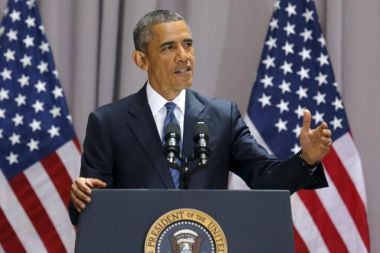Obama set to release $150-billion Iranian assets as US Senate fails to block nuke deal

US President Barack Obama is all set to implement the highly controversial Iran nuclear deal, including the release to Tehran of $150 billion worth of frozen Iranian assets, after the US Senate failed to pass a resolution of disapproval to block the measure before the weekend.
Critics fear that Iran would use its recovered assets to boost financing to terrorist movements in the region.
US Secretary of State John Kerry has appointed Ambassador Stephen Mull "as lead coordinator for Iran Nuclear Implementation" after the 60-day congressional review period lapsed.
Kerry said Mull "will lead the interagency effort to ensure that the nuclear steps Iran committed to in the JCPOA [Joint Comprehensive Plan of Action] are fully implemented and verified, and that we and our partners are taking reciprocal action on sanctions, following the nuclear steps."
Mull is the US ambassador to Poland and served as executive secretary at the State Department from 2010 to 2012. He also served as senior advisor to then-Undersecretary of State for Political Affairs William Burns and worked on issues related to Iran's nuclear programme.
He played a key role "in designing United Nations Security Council Resolution 1929, which imposed additional nuclear-related sanctions on Iran, and marshalling support for its adoption by the Council."
The review period expired on Thursday, according to Newsmax, as Republican lawmakers failed for a third time to end the filibuster by Democrats.
The deal between Iran and the US and five other countries would give Iran $150 billion that has been held up through sanctions.
Although the way has been cleared for the implementation of the deal, Senate Majority Leader Mitch McConnell's spokesman said "the Iran issue is not going away," adding that the deal will "likely will be revisited by the next commander-in-chief."
House Speaker John Boehner said he's mulling on legal action to block the deal.
Israeli Prime Minister Benjamin Netanyahu told Congress last March that the deal was a "countdown to a potential nuclear nightmare" by a country that "will always be an enemy of America."
The compliance date for the agreement is on Oct. 18 as President Obama starts issuing waiver on sanctions that would not occur unless the International Atomic Energy Agency (IAEA) verifies Iran's full compliance.
The European Union would also end ban on imports of Iranian oil.
President Obama will instruct the State Department, the Treasury Department and other US agencies to lay the groundwork in lifting sanctions against Iran.
Iran's compliance will end UN penalties although some will remain, including an arms embargo that will last five years, a ballistic missile technology ban for up to eight years, and a ban on transferring any unauthorised nuclear goods for a decade.











